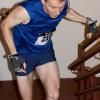https://www.ncbi.nlm...pubmed/23736827
"dramatic short-term anti-VEGF type effect including anatomic restoration of retinal structure"
Observation of human retinal remodeling in octogenarians with a resveratrol based nutritional supplement.
Abstract
Purpose: Rare spontaneous remissions from age-related macular degeneration (AMD) suggest the human retina has large regenerative capacity, even in advanced age. We present examples of robust improvement of retinal structure and function using an OTC oral resveratrol (RV) based nutritional supplement called Longevinex® or L/RV (circa 2004, Resveratrol Partners, LLC, Las Vegas, NV, USA). RV, a polyphenolic phytoalexin caloric-restriction mimic, induces hormesis at low doses with widespread beneficial effects on systemic health. RV alone inhibits neovascularization in the murine retina. Thus far, published evidence includes L/RV mitigation of experimentally induced murine cardiovascular reperfusion injury, amelioration of human atherosclerosis serum biomarkers in a human Japanese randomized placebo controlled trial, modulation of micro RNA 20b and 539 that control hypoxia-inducing-factor (HIF-1) and vascular endothelial growth factor (VEGF) genes in the murine heart (RV inhibited micro RNA20b 189-fold, L/RV 1366-fold). Little is known about the effects of L/RV on human ocular pathology. Methods: Absent FDA IRB approval, but with permission from our Chief of Staff and medical center IRB, L/RV is reserved for AMD patients, on a case-by-case compassionate care basis. Patients include those who progress on AREDS II type supplements, refuse intra-vitreal anti-VEGF injections or fail to respond to Lucentis®, Avastin® or Eylea®. Patients are clinically followed traditionally as well as with multi-spectral retinal imaging, visual acuity, contrast sensitivity, cone glare recovery and macular visual fields. Three cases are presented. Results: Observed dramatic short-term anti-VEGF type effect including anatomic restoration of retinal structure with a suggestion of improvement in choroidal blood flow by near IR multispectral imaging. The visual function improvement mirrors the effect seen anatomically. The effect is bilateral with the added benefit of better RPE function. Effects have lasted for one year or longer when taken daily, at which point one patient required initiation of anti-VEGF agents. Unanticipated systemic benefits were observed. Conclusions: Preliminary observations support previous publications in animals and humans. Restoration of structure and visual function in octogenarians with daily oral consumption of L/RV is documented. Applications include failure on AREDS II supplements, refusing or failing conventional anti-VEGF therapy, adjunct therapy to improve RPE function, and compassionate use in medically underserved or economically depressed third-world countries.














































